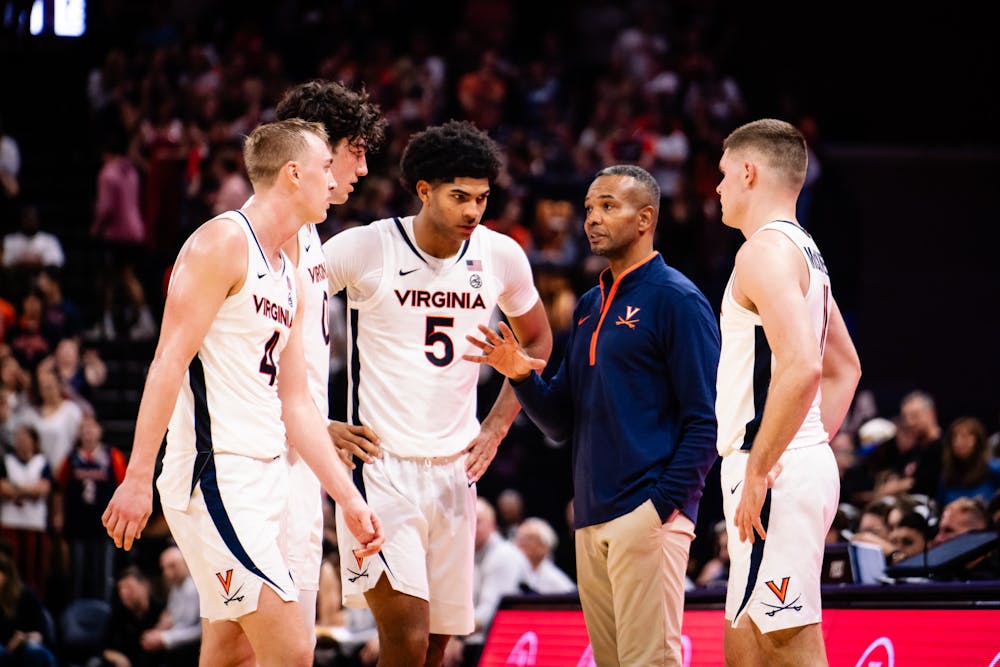Tony Bennett wanted to call Jay Wright. As he teetered on the brink of his 16th season helming the Virginia men’s basketball program, he wanted advice from a like-minded contemporary. He wanted to see what Wright, the former Villanova coach who retired suddenly in 2022, had to say about whether it was worth it to continue coaching in the modern era of college basketball, one inextricably linked with Name, Image and Likeness.
“I gotta call Jay Wright and see what he says, right?” Bennett said to ESPN’s Jeff Borzello at this year’s ACC Tipoff event.
Bennett retired a week later. He explained he no longer felt “equipped” to continue coaching, echoing Wright’s statement two years ago that he had lost “that edge that I’ve always had.”
Bennett, in making his decision, never actually called Wright. But he left his program in an almost identical position — trying to recover from the shocking departure of a young coach less than five years removed from a national title.
Now Virginia and Villanova will converge Friday in Baltimore, Md., in the first game of a Basketball Hall of Fame Series doubleheader at 5 p.m. The matchup always represented an appetizing clash of recent college basketball royalty. Now it comes freighted with something extra.
Ron Sanchez and Kyle Neptune, not Bennett and Wright, will pace the sideline, at different stages of parallel journeys.
The two schools they represent — one a small Catholic institution in the northeast, the other a southern state’s flagship public university — feel oddly intertwined. The reason is simple. The school’s two most prominent figures, for so long, were basketball coaches, and they molded analogous programs.
“Tony is one of the most talented and toughest coaches we ever competed against,” Wright said in a tweet after Bennett’s retirement. “A class guy — inspirational — spiritual and an incredible competitor.”
Wright was much the same. People often exalted him and Bennett as emblems of what college basketball should be, great guys always good for some postgame wisdom. No one ever doubted their character.
Bennett always valued development, sculpting lower-rated recruits over four-year careers. Wright approached things the same way. He brought in more five-stars, perhaps, but he never succumbed to the one-and-done model.
It went beyond recruiting philosophy. Charges of flimsiness, for a long time, followed around both coaches. They would bulldoze through the regular season, winning a lot of games, earning a high NCAA Tournament seed. Then they would collapse on the big stage.
Wright lost in the second round twice as a No. 2 seed and once as a No. 1 seed. Virginia earned a No. 1 or a No. 2 seed in four out of five years from 2014 to 2018 and never reached the Final Four. Of course, it also suffered the greatest upset in the sport’s history when it fell to No. 16 seed UMBC in 2018.
Then came 2016 for Villanova, the year in which it won a national title, and that achievement came again in 2018. The title came for Virginia in 2019, after an incredible run.
But now the coaches who burnished the two program’s reputations are gone. It is easy to wonder, after the upheaval, whether things will change. Some argue it will not.
“This brand is bigger than anything,” Campbell Coach Kevin McGeehan said Nov. 6 after Virginia’s season-opening win over the Fighting Camels. “They have a culture here, a significant culture of basketball, winning, toughness and defense. And that’s present even with a different guy in the main seat.”
But people said that two years ago, while Villanova experienced seismic change. And things at Villanova have since gone decidedly south. The Wildcats missed the NCAA Tournament in Neptune’s first two seasons. Their record this season stands at 2-2, the losses coming against Columbia and Saint Joseph’s.
Wright lost twice to sub-100 teams in the KenPom ranking in his last nine seasons. Neptune has done it twice this season — and eight times in his short tenure.
“It is what it is,” Neptune said after the Columbia loss Nov. 6. “We’re human beings. You don’t want to come in and lose. Everyone wants to win.”
That comment, after a surprising loss, looks like evidence of a slipping standard. Sanchez hopes to avoid a similar trajectory. He has done well so far — Virginia won its first two games, comfortably if not always dominantly. Sanchez quipped after the first win that he only needed 363 more wins to catch his predecessor.
He talked with Bennett on the phone before the opener. Sanchez figured the call was coming, so he beat Bennett to it.
“I said, ‘I’m beating you to the punch, in case you were thinking about calling me,’” Sanchez said. “He said, ‘Why would I call you today?’ That’s what he said to me. I said, ‘I don’t know. I have a game, you know?’”
Bennett wished Sanchez luck and told him he was praying for him. Sanchez said his first game in charge certainly packed the emotion.
It may have felt weird for many fans to see Sanchez out there instead of Bennett. Friday, in that respect, will seem even more bizarre.
Two programs, absent the coaches with whom their names are synonymous, will take the court. They stand at different junctures along parallel railroad tracks. The tracks will merge Friday, and the teams will play, one hoping not to become the other.







